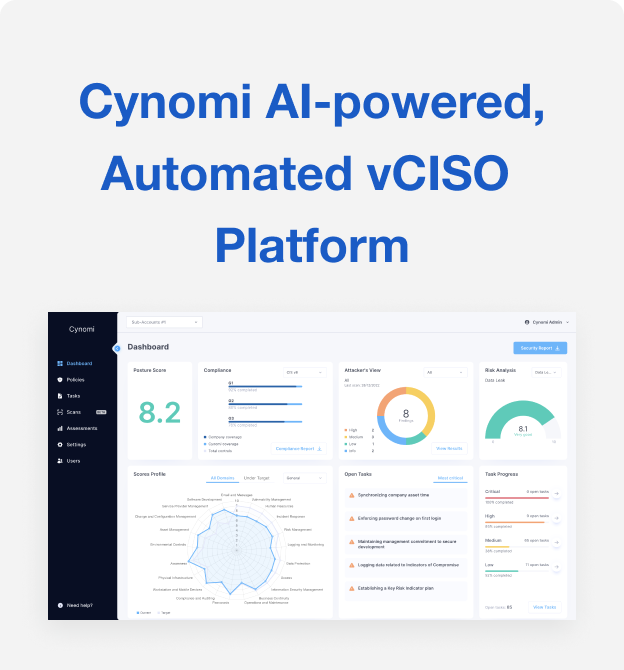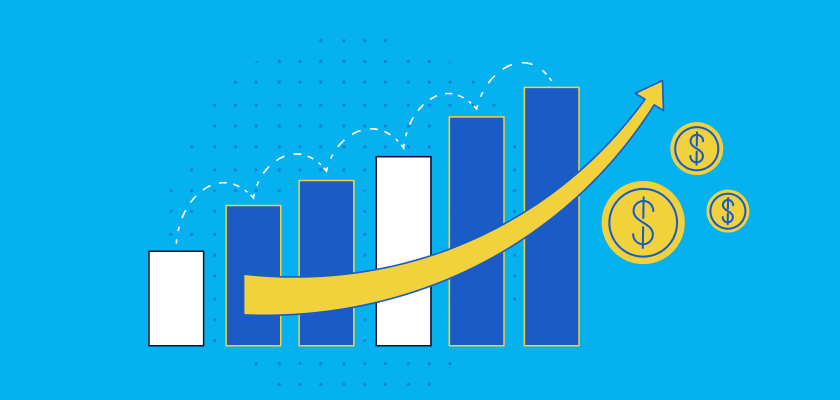How to Choose a vCISO Service Provider: 7 Considerations

In an era where cybersecurity threats have become an unfortunate part of everyday business, organizations can no longer ignore the need to secure their digital landscapes. However, hiring an in-house security team is not always the most cost-effective approach. It is also not always easy to find the right talent for your business. This is where vCISOs come into play. vCISOs not only provide an effective and affordable way to gain high-level expertise, but they also allow organizations to stay one step ahead of the ever-evolving world of cyber threats.
How can you be sure you are choosing the right vCISO for your company’s needs? What’s the best way to select a vendor or a solution that provides you with what you actually need, all that you need and only what you need (and charges accordingly)? Let’s delve in.
What is a vCISO?
A vCISO (Virtual Chief Information Security Officer) is an external executive who provides organizations with strategic and hands-on cybersecurity services. The vCISO functions just like an in-house CISO, but operates on a part-time, remote, or contract basis. This allows small and mid-size businesses to benefit from high-level cybersecurity expertise without bearing the cost of a full-time executive. Organizations can also enjoy the flexibility of an external service, and scale service scope up and down based on changing needs.
The responsibilities of a vCISO include the development and management of a cybersecurity strategy, risk and vulnerability management, incident response planning, security training, compliance ownership, budget and vendor management, and more.
The growing importance of the CISO has also made the vCISO a widely-acknowledged term. According to a survey by Cynomi, 78% of respondents say that a vCISO is an external, part-time CISO, and not, say, a technological solution or and interim CISO.
Benefits of a vCISO
vCISOs can bring exceptional value to organizations. They help reduce the attack surface and navigate threats and attacks to secure the organization’s valuable resources. Additional key benefits include:
- Access to deep cybersecurity expertise
- Cost savings compared to a full-time hire
- Flexibility to determine engagement duration and services scope
- More time for the executive team to focus on core business functions
- Enhancing the internal team’s skills set and capabilities
- Effective risk mitigation with minimal impact
Considerations When Choosing a vCISO Provider:
There are many excellent vCISOs available to work with. How can organizations cherry-pick the best one for their needs? It is recommended to take the following considerations into account.
1. Relevant Expertise and Industry Knowledge
The vCISO provider you choose should have an in-depth understanding of your industry and hold relevant certifications such as CISSP, CISM, or CRISC that indicate professional expertise. Specialized knowledge of up-to-date technologies, industry best practices and compliance requirements will allow them to develop a relevant and accurate security strategy and implement advanced controls. As a result, they will be able to effectively ensure the organization stays ahead of any new threats, vulnerabilities and attack vectors. In case of an incident, they will know how to navigate the incident response and recovery efforts.
2. Service Offering
Every organization has its own unique security requirements. These requirements are based on your industry, compliance regulations you are required to adhere to, your tech and security stack, your organization’s size, your budget and business objectives and whether you have any in-house security professionals.
The services offered by the vCISO provider must be tailored to these needs. Whether you need risk management, a cybersecurity strategy and plan, help with a compliance audit, employee training, or incident response, ensure the provider can cater to your specific requirements.
3. Uses an Automated vCISO Platform
An automated vCISO platform enhances vCISOs’ service offering with additional capabilities, like advanced security strategies or remediation recommendations. This augments the value the organization receives from the vCISO. In addition, with an automated vCISO platform, there is less chance of human error, security deliverables are accurate, easy to consume, trackable, and delivered in an efficient manner, which is also beneficial to organizations. Therefore, it is recommended to ensure the hired vCISO uses the most up-to-date automated vCISO platform in the market.
4. Demonstrated Experience
A proven track record is critical for ensuring the vCISO can make the right and relevant decisions for your organization and positively impact the organization’s security posture. Look for a vCISO provider that has a history of success in managing cybersecurity programs and addressing threats and incidents in a similar industry or business size as yours. Industry accolades, client and peer reviews, certifications and referrals can help you gain insights into the experience and value the vCISO can bring to the organization.
5. Compliance Knowledge
Different industries and geographies have different regulatory standards to adhere to. For example, businesses operating in Europe need to adhere to GDPR, the healthcare industry needs to comply with HIPAA, many financial organizations are required to meet PCI-DSS standards, and more.
The vCISO provider must have experience with developing strategies and working with vendors that meet these regulations, to ensure that your organization remains compliant and can pass audits. This is essential for legal purposes, for minimizing risk and for maintaining customer trust.
6. Cost and Budget
Understand the pricing structure, payment terms and schedule, any contractual obligations and the scope of services – upfront. By understanding the overall costs and what they include, your organization can plan and allocate the necessary budget effectively. For example, if the cost only includes strategy and not implementation, you will need to budget for more hands-on resources. If you are required to purchase additional technologies and products, those need to be budgeted for as well.
Make sure the cost justifies the value received and that the provided services cover all your business requirements. It is recommended to give yourself room for flexibility, in case you need to scale up (or down) services, so you don’t find yourself in a rigid and expensive lock-in.
7. Cultural Fit
Lastly, the vCISO provider should align with your company values and culture. They must be able to work seamlessly with your team, create a sense of trust among leadership, understand your business’s ethos, and be a good fit for your organization’s working style. This will ensure the vCISO’s strategies, policies, and practices are aligned with your organization’s overall vision and direction and can be successfully and effectively implemented in the organization.
Ready to Choose a vCISO?
Choosing a vCISO provider has a direct impact on your organization’s cybersecurity posture. By considering the provider’s expertise, service offering, experience, compliance capabilities, cost, and cultural fit, you can ensure that your vCISO will not only protect your organization from cyber threats but will also align with your business objectives and values. With the right vCISO partner, you can navigate the digital landscape confidently and securely.
Looking for a vCISO? Check out the recently published directory of vCISO service providers here.








